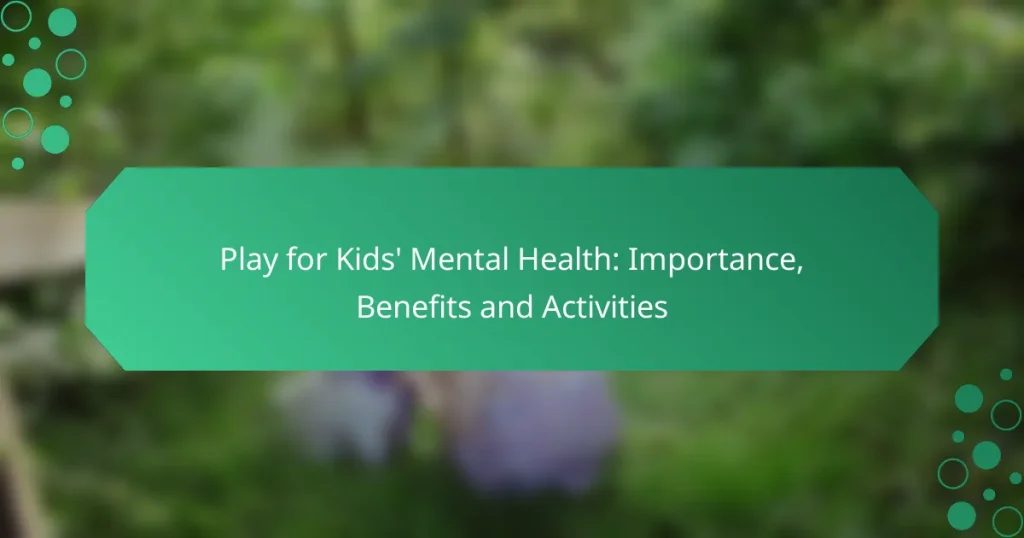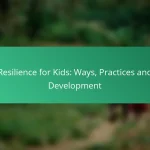Play is essential for children’s mental health, as it promotes emotional development, social skills, and stress relief. By engaging in various types of play, such as free play, structured activities, and creative arts, children can express themselves and build resilience in a supportive environment. Encouraging diverse play experiences helps foster creativity and emotional well-being in young minds.

How Does Play Benefit Kids’ Mental Health?
Play significantly benefits kids’ mental health by fostering emotional development, enhancing social interactions, and providing a safe outlet for stress. Engaging in play allows children to express themselves, build resilience, and develop coping strategies in a fun and relaxed environment.
Enhances emotional resilience
Play helps children build emotional resilience by allowing them to navigate challenges in a low-stakes setting. Through role-playing and imaginative scenarios, kids learn to cope with disappointment, frustration, and other emotions. This practice prepares them for real-life situations where they must adapt and recover from setbacks.
For example, when children engage in pretend play, they often encounter conflicts or obstacles that require problem-solving. This process teaches them to manage their feelings and develop a stronger sense of self-efficacy.
Improves social skills
Through play, children learn essential social skills such as cooperation, negotiation, and empathy. Group activities, whether structured or unstructured, encourage kids to interact with peers, share resources, and resolve conflicts. These interactions help them understand social cues and develop meaningful relationships.
Participating in team sports or group games can be particularly beneficial, as they require communication and teamwork. Children who play together often form bonds that enhance their social networks and emotional support systems.
Reduces anxiety and stress
Engaging in play can significantly reduce anxiety and stress levels in children. Play provides a distraction from worries and allows kids to express their feelings in a safe environment. Activities like outdoor play or creative arts can serve as effective stress relievers.
Encouraging regular playtime, especially in nature or with friends, can help children manage their emotions and feel more relaxed. Parents should aim for at least an hour of active play each day to support their child’s mental well-being.
Boosts creativity and imagination
Play stimulates creativity and imagination, essential components of cognitive development. When children engage in imaginative play, they explore new ideas and scenarios, which enhances their problem-solving skills and innovative thinking. This creative outlet is vital for their overall mental health.
Activities like building with blocks, drawing, or storytelling encourage children to think outside the box. Parents can foster creativity by providing diverse materials and opportunities for open-ended play.
Promotes physical health
Physical play is closely linked to mental health, as it promotes overall well-being. Active play helps children develop motor skills, coordination, and strength, which are crucial for their physical development. Additionally, regular physical activity releases endorphins, which improve mood and reduce feelings of anxiety.
Encouraging children to participate in various physical activities, such as sports, dancing, or simply playing outside, supports both their mental and physical health. Aim for a mix of structured and unstructured play to keep children engaged and active.

What Types of Play Are Most Effective?
Effective play for kids encompasses various types that support their mental health, including free play, structured play, outdoor activities, and creative arts and crafts. Each type offers unique benefits that contribute to emotional, social, and cognitive development.
Free play
Free play allows children to engage in unstructured activities where they can explore their interests and express themselves. This type of play fosters creativity, problem-solving skills, and independence as kids make their own choices without adult intervention.
Encourage free play by providing a safe environment with diverse materials and spaces. Limit screen time to promote more hands-on experiences, which can significantly enhance imaginative play.
Structured play
Structured play involves guided activities with specific rules and goals, such as team sports or organized games. This type of play helps children learn cooperation, teamwork, and discipline while also developing physical skills.
When introducing structured play, ensure that the activities are age-appropriate and inclusive. Balance structured time with free play to allow for flexibility and creativity in children’s experiences.
Outdoor activities
Outdoor activities, such as hiking, biking, or playing in parks, provide children with opportunities to connect with nature and engage in physical exercise. These activities can reduce stress, improve mood, and enhance overall mental well-being.
Encourage regular outdoor play by scheduling family outings or playdates in natural settings. Aim for at least a few hours each week to maximize the mental health benefits associated with being outdoors.
Creative arts and crafts
Creative arts and crafts allow children to express their emotions and thoughts through various mediums, such as drawing, painting, or sculpting. Engaging in these activities can boost self-esteem and provide a sense of accomplishment.
Provide a variety of materials and encourage experimentation without focusing on the final product. This approach nurtures creativity and helps children process their feelings in a constructive way.

What Activities Can Parents Encourage?
Parents can encourage a variety of activities that promote children’s mental health through play. Engaging in structured and unstructured play helps children develop social skills, creativity, and emotional resilience.
Group sports
Group sports are an excellent way for children to build teamwork and communication skills while staying physically active. Activities like soccer, basketball, or swimming can foster a sense of belonging and improve self-esteem.
When selecting a sport, consider your child’s interests and physical abilities. Look for local leagues or school teams that offer age-appropriate options, ensuring a supportive environment for participation.
Imaginative play scenarios
Imaginative play scenarios, such as role-playing or storytelling, allow children to express their creativity and explore different perspectives. This type of play can enhance problem-solving skills and emotional understanding.
Encourage imaginative play by providing props or costumes and setting up themed areas at home. Simple activities like playing house, pretending to be superheroes, or creating a mini restaurant can spark their imagination.
Nature exploration
Nature exploration encourages children to connect with the environment, promoting curiosity and a sense of adventure. Activities like hiking, gardening, or simply observing wildlife can enhance their appreciation for nature and reduce stress.
Plan regular outdoor excursions, such as visiting parks or nature reserves, and encourage children to collect leaves, rocks, or insects. This hands-on experience can foster a love for the outdoors and stimulate their senses.
Board games and puzzles
Board games and puzzles are great for developing critical thinking and social skills. They encourage strategic thinking, patience, and cooperation while providing a fun way for families to bond.
Select games that are age-appropriate and promote collaboration or friendly competition. Aim for a mix of classic games and new ones to keep the experience fresh and engaging for your children.

How Can Schools Support Play for Mental Health?
Schools can play a vital role in supporting children’s mental health through structured play opportunities. By integrating play into daily activities, creating safe environments, and promoting peer interactions, schools can foster emotional well-being and resilience among students.
Integrating play into the curriculum
Integrating play into the curriculum involves incorporating playful activities into academic lessons. This can include using games to teach math concepts or incorporating role-playing in language arts to enhance engagement and understanding.
Teachers can allocate specific times for unstructured play, allowing students to explore and interact freely. This balance between structured learning and play can enhance cognitive development and reduce stress.
Creating safe play environments
Creating safe play environments is essential for encouraging children to engage in play without fear of injury or bullying. Schools should ensure that playgrounds are well-maintained and equipped with age-appropriate equipment.
Additionally, establishing clear rules and guidelines for behavior during playtime can help maintain a positive atmosphere. Regular training for staff on conflict resolution and supervision can further enhance safety and inclusivity.
Encouraging peer interaction
Encouraging peer interaction through play helps children develop social skills and build friendships. Schools can facilitate group games and collaborative projects that require teamwork and communication.
Organizing events like field days or play festivals can also promote interaction among students from different classes or grades. These activities not only enhance social bonds but also contribute to a supportive school community.


